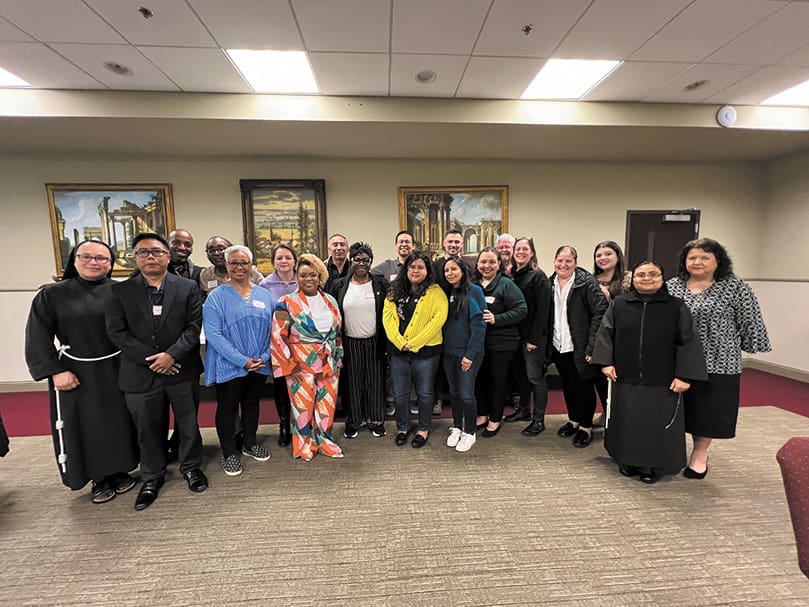 Photo by Vic Romero
Photo by Vic RomeroAtlanta
New intercultural commission to embrace diversity in the archdiocese
By NATALIA DURON, Staff Writer | Published May 2, 2024 | En Español
ATLANTA—The Archdiocese of Atlanta has launched an intercultural commission in the Office of Intercultural Ministries. The commission will cater to the needs of families of various cultures and embrace diversity in the archdiocese.
The Office of Intercultural Ministries created the commission under the recommendation of the Catholic Leadership Institute. The institute stressed the initiative to focus on diversity in the archdiocese in a more intentional way, said Deacon Dennis Dorner, chancellor of the archdiocese.
The intercultural commission is led by Deacon Dorner; Yolanda Munoz, director of Hispanic and Latino Ministries and Ashley Morris, director of Black Catholic Affairs. The Office of Intercultural Ministries is currently seeking a director for Asian and Pacific Islands communities to help guide the commission.
The commission’s goal is to create a space that is safe and open for discussion, and to speak about the issues and experiences of each group represented. Deacon Dorner said that the meetings will resemble the synodal process. The members will create an agenda that outlines the needs of their communities. After a discussion on these topics, the members and directors will collaborate. Munoz and Morris will then report to Deacon Dorner, and he will report to the bishops.
“The main voices are the people that sit in the pews,” Deacon Dorner said. “They’re the ones who don’t really get a voice.”
The intercultural commission currently has 29 members from parishes throughout the archdiocese. The members were recommended by priests to the directors of the Intercultural Ministries, and then were selected during a discernment retreat. Their first meeting was on April 6, and they will meet quarterly. The next meetings will be in July and October.
There is one member representing Brazil, one member of the Indian American community and one member representing the Philippines.
Vic Romero, the member representing the Filipino community, is active in the community and was the president of the Filipino American Association of Greater Atlanta in 1992 and 2002. He said this commission will expand awareness of the diversity in the archdiocese.
“When I was selected for the commission, I jumped right in,” Romero said. “I believe in the commission’s goal—to bring in a sense of togetherness.”
The Anglo, Vietnamese, African and Burmese communities all have two members each representing them.
Three members in the commission represent the African American community. The Hispanic community is represented by 15 members.
The commission will be a turning point for representing the many cultural backgrounds within the Hispanic community, said Munoz.
“Each person is getting a voice for their culture and for their parish, and it’s important to listen to them,” Munoz said. “There are distinct countries being represented: Mexico, Ecuador, Colombia and others. We have different countries so that we can hear from everyone.”
Morris said this same concept applies to the African American and African community members in the commission. Each member has their own experience that others can relate to or not, but their voices being heard will bring new and important conversations, Morris said.
“The Black experience is a wide variety of experiences,” Morris said. “There’s a vast amount of diversity in which we consider differs by age, cultural expressions and experiences, that goes along with our ministry.”
A prevalent concern across several communities is promoting leadership for young adults, Munoz said. A few members representing the Hispanic community are young adults. Romero also emphasized the need for young adults in the church, and he hopes this commission reels in their interest.
“There are pastoral needs of younger people not only in the Filipino community, but in the many communities we represent,” Romero said. “I feel the commission will touch on that issue.”
Putting the spotlight on distinct cultures and experiences is the focus of the commission. Both directors and Deacon Dorner said the driving force of the intercultural commission is to listen to the members’ voices.
“Representation is important, if you are able to see yourself in a process or project, then the information you are receiving hits the heart differently,” Morris said. “It’s important for our cultural families to see themselves as a part of the work of the archdiocese through their brothers and sisters in the intercultural commission. It’s important for not only sustaining our faith, but also for the future of our faith.”